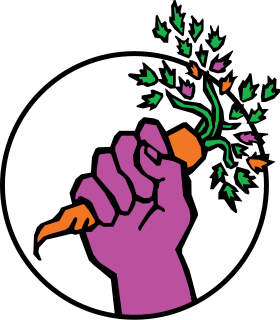 W
WA black bloc is a tactic used by protesters who wear black clothing, ski masks, scarves, sunglasses, motorcycle helmets with padding, or other face-concealing and face-protecting items. The clothing is used to conceal wearers' identities and hinder criminal prosecution by making it difficult to distinguish between participants. It is also used to protect their faces and eyes from pepper spray, which is used by police during protests or civil unrest. The tactic allows the group to appear as one large unified mass. Black bloc participants are often associated with anarchism, anarcho-communism, communism, libertarian socialism, antifascism, or the anti-globalization movement.
 W
WBullshit Detector was the name of a series of compilation LPs put together by the anarcho-punk band Crass and released on their Crass Records label. Three editions were released between 1980 and 1984, consisting of demo tapes, rough recordings and artwork that had been sent to the band. The sound quality of the Bullshit Detector series was mixed, and was often very basic or poor as Crass would master the tapes directly to record without any additional production or enhancement. For Crass, the expectation of a polished performance was missing the point of the DIY punk ethic:"Don't expect music when the melody is anger, when the message sings defiance, three chords are frustration when the words are from the heart"
 W
WCrass Records was an independent record label which was set up by the anarchist punk band Crass.
 W
WFood Not Bombs is a loose-knit group of independent collectives, sharing free vegan and vegetarian food with others. Food Not Bombs' ideology is that myriad corporate and government priorities are skewed to allow hunger to persist in the midst of abundance. To demonstrate this and to reduce costs, a large amount of the food served by the group is surplus food from grocery stores, bakeries and markets that would otherwise go to waste, or occasionally has already been thrown away. This group exhibits a form of franchise activism.
 W
W"People" is a song by English band the 1975 from their fourth studio album, Notes on a Conditional Form (2020). The song was released on 22 August 2019, through Dirty Hit and Polydor Records as the lead single from the album. It was written by band members George Daniel, Matthew Healy, Adam Hann and Ross MacDonald. Production of the song was handled by Daniel and Healy alongside Jonathan Gilmore. An anarcho-punk and screamo song, it features an intense, heavy rock instrumentation consisting of desert-rock guitar riffs, straightforward chords, breakneck drums and "renegade" percussion. Lyrically, it is a protest song that calls for change and rebellion to deal with global, political and environmental turmoil, and deals with themes of desperation, urgency and anxiety.
 W
WSquatting is the action of occupying an abandoned or unoccupied area of land or a building, usually residential, that the squatter does not own, rent or otherwise have lawful permission to use. United Nations estimated in 2003 there were one billion slum residents and squatters globally. Squatting occurs worldwide and tends to occur when people who are poor and homeless find empty buildings or land to occupy for housing. It has a long history, broken down by country below.
 W
WSquatting in England and Wales usually refers to a person who is not the owner, taking possession of land or an empty house. People squat for a variety of reasons which include needing a home, protest, poverty, and recreation. Many squats are residential, some are also opened as social centres. Land may be occupied by New Age travellers or treesitters.
 W
WSquatting in the Netherlands is the occupation of unused or derelict buildings or land without the permission of the owner. The modern squatters movement began in the 1960s in the Netherlands. By the 1980s, it had become a powerful anarchist social movement which regularly came into conflict with the state, particularly in Amsterdam with the Vondelstraat and coronation riots.